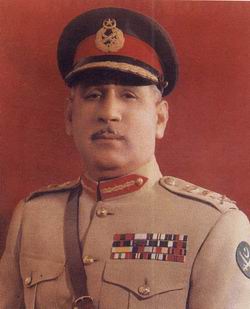Related Research Articles

Tikka Khan was a Pakistani military officer who served as the first chief of the army staff from 1972 to 1976. Along with Yahya Khan, he is considered a chief architect of the 1971 Bangladesh genocide which according to independent researchers led to the deaths of 300,000 to 500,000 people.

Chief Justice Hamoodur Rahman, NI. HI, was a Pakistani Bengali jurist and an academic who served as the Chief Justice of Pakistan from 18 November 1968 until 31 October 1975.

Sheikh Anwarul Haq, was a Pakistani jurist and an academic who served as the 9th Chief Justice of Pakistan from 23 September 1977 until resigning on 25 March 1981. He signed the death warrant for former Prime Minister Zulfikar Ali Bhutto in a controversial murder case. Bhutto was executed on April 4, 1979.

Ali Ahmed Fazeel was a Pakistani Attorney General.

Rana Bhagwandas was a Pakistani jurist who served as a senior judge and Chief Justice of the Supreme Court of Pakistan (CJP). He enjoyed extremely high reputation as a judge. He remained the acting CJP during the 2007 judicial crisis in Pakistan, and also briefly became the acting Chief Justice of Pakistan when the incumbent Iftikhar Muhammad Chaudhry went on foreign tours in 2005 and 2006, and thus became the first Hindu and the second non-Muslim to serve as chief of the highest court in Pakistan. Rana Bhagwandas also worked as the Chairman of Federal Public Service Commission of Pakistan. He headed the interview panel for the selection of the federal civil servants in 2009.

Nasir Aslam Zahid ; Barrister-at-Law, is a Pakistani judge who served as the Chief Justice of the Sindh High Court and then a judge of the Federal Shariat Court of Pakistan and Supreme Court of Pakistan.

Saeed Uz Zaman Siddiqui was a Pakistani jurist and legislator of great prominence who formerly served as the 15th Chief Justice of Pakistan and, prior to that, the 7th Chief Justice of the Sindh High Court. At the time of his death, he was serving as the 31st Governor of Sindh.

The High Court of Sindh is the highest judicial institution of the Pakistani province of Sindh. Established in 1906, the Court situated in the provincial capital at Karachi. Apart from being the highest Court of Appeal for Sindh in civil and criminal matters, the Court was the District Court and the Court of Session in Karachi.

Makhdoom Ali Khan, is a Pakistani lawyer who is a Senior Advocate Supreme Court. Khan has held numerous positions, including Attorney General of Pakistan, chairman of the Pakistan Bar Council, member of the Law and Justice Commission of Pakistan, board member of the Federal Judicial Academy of Pakistan and of the Sindh Judicial Academy.

The Sindh Muslim Government Law College or S. M. Law College is one of the oldest law schools of Pakistan, situated in Karachi, Sindh. The college has produced numerous notables including Chief Justices of Pakistan, Chief Justices of Federal Shariat Court, Chief Ministers of Sindh, Federal Ministers, and many judges of the Supreme Court of Pakistan and Sindh High Court.

The Balochistan High Court is the highest judicial institution of Balochistan, Pakistan. The court is formally known as the High Court of Balochistan. It is situated in the provincial capital, Quetta.

Agha Rafiq Ahmed Khan a Pakistani jurist belongs to Garhi Yasin in Shikarpur District of Sindh, Pakistan. He is the son-in-law of Justice Mushtak Ali Kazi, who was a Judge of High Court of Sindh and Balochistan. Justice Agha is a Senior Advocate of the Supreme Court of Pakistan. He served as the 12th Chief Justice of the Federal Shariat Court of Pakistan from 2009 to 2014.

Justice Mushtak Ali Kazi, was a Pakistani jurist and writer, who served as a Judge of the High Court of Sindh and Balochistan.

Iqbal Hameedur Rahman, was a senior judge of the Supreme Court of Pakistan. He is of Bengali origin and born in Dacca, East Pakistan. He served as the Justice of the Supreme Court of Pakistan, as appointed in this post on 24 February 2013 and voluntarily tendered his resignation on 24 October 2016.
Hassanally A Rahman was born in Karachi, Sindh, to a prominent and respectable family of legal professionals, government officers, and people actively involved in the education sector. His father was Barrister Abdurrahman. He received his barrister-at-law from Middle Temple, England in 1934. He was one of the founding architects along with his younger brother Tufail Ali Abdul Rehman of the Sindh Muslim Government Law College in Karachi. He also served as the first principal of the college. Known as a social and community leader, Rahman was the vice chancellor of Sindh University, Jamshoro, where he served twice in the same capacity.
Murtaza Wahab Siddiqui is a Pakistani politician who is the current Mayor of Karachi. He was a member of the Senate of Pakistan from August 2017 to March 2018.

Gulzar Ahmed is a Pakistani jurist who served as the 27th Chief Justice of Pakistan from 21 December 2019 to 1 February 2022.
References
- ↑ An introduction to the Sindh Muslim Law College Archived 2008-01-27 at the Wayback Machine
- ↑ An introduction to the University of Sindh Archived 2005-08-31 at the Wayback Machine
- ↑ Details of the Hamood ur Rehman Commission
- ↑ A book on the Hamood ur Rehman Commission Report Archived 2010-09-20 at the Wayback Machine
- ↑ Prominent personalities of the Memon community